CRM 2015 Review
Microsoft have released CRM 2015 which rather than being a
complete look and feel update that we saw with CRM 4, CRM 2011, and CRM 2013 is
instead an update on the changes that were included in 2013.
The release is more focused on functionality updates rather
than the design updates many CRM users are useful. This is obviously some good news as there is
nothing more annoying than training business users in one look and feel only to
have it completely change every 12-24 months.
This article is my observations of the differences between
two vanilla instances of CRM (One 2013, one 2015). There is probably a fair bit of information I
have missed which can be discovered via Microsoft’s documentation. However onto the article!
CRM Ribbon
The first difference when logging into 2015 is there is a
new search box and icon clearly visible on the ribbon.
| CRM 2013 - Ribbon |
| CRM 2015 - Ribbon |
Entering a keyword(s) into the search box returns the
results found by the query. Currently it
appears to be limited to Account, Contact, Lead, Opportunity, User, Competitor,
Activity, and Case entities. This is a
bit of an issue if you have a CRM implementation with a lot of custom entities
however for now I’m presuming it might be a configuration I haven’t found yet.
The icon beside it is the Advanced Find icon which pops up
the standard Advanced Find window.
Advanced Find could often get lost in CRM2013 and having it in such and
easy to find place will definitely help regular business
Colours and Theming
The colours of some of the OOB entities have changed which
seems like a slightly odd decision (I don’t recall anyone really complaining
about it) however the standard ribbon functionality seems to be the same.
 |
| CRM 2013 - Entities Menu |
| CRM 2015 - Entities Menu |
The forms also appear to have had minor changes to colours however
if you have clients using CRM 2013 then they should be able to continue
navigating around the system easy enough.
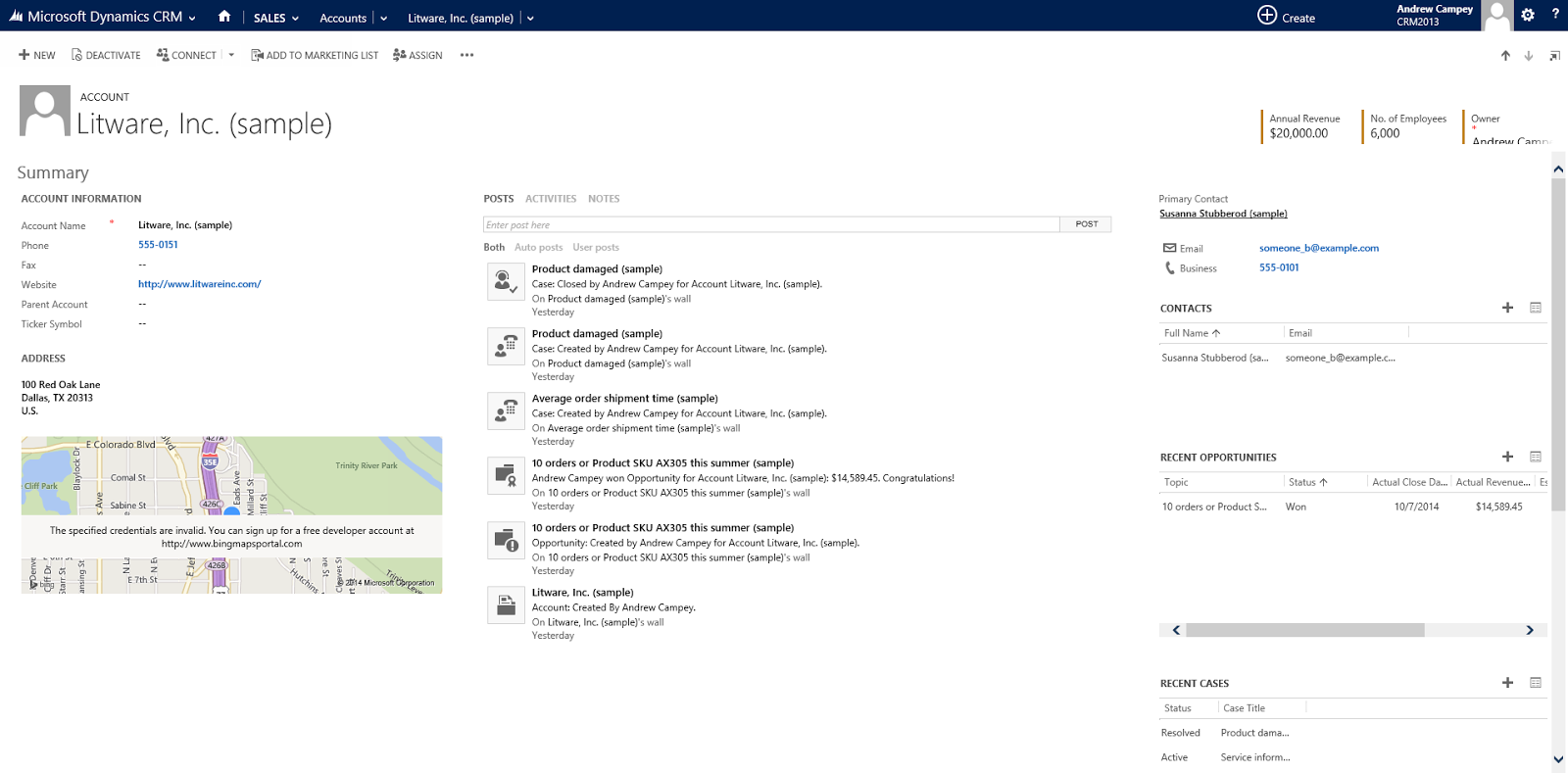 |
| CRM 2013 - Account Form |
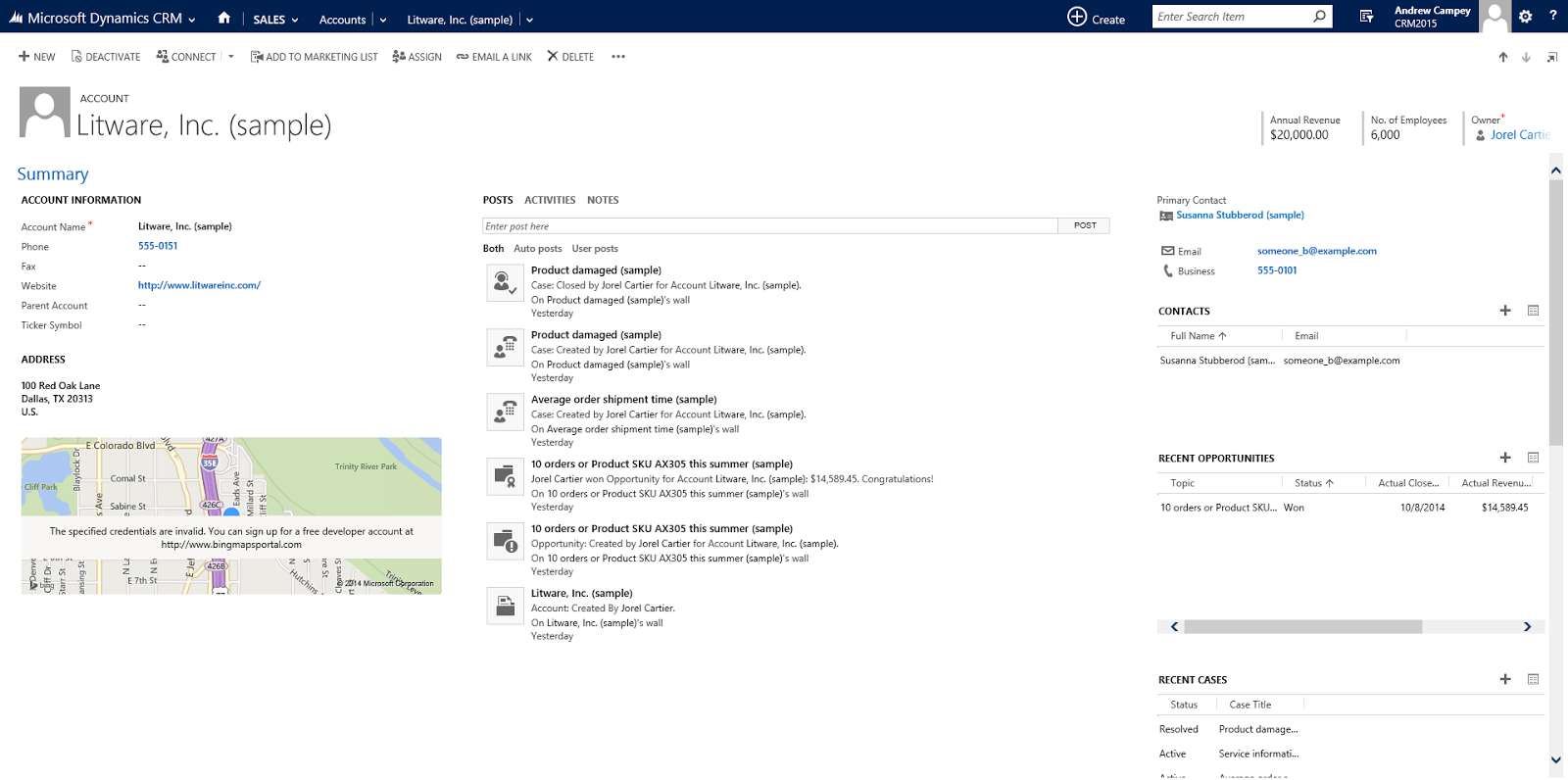 |
| CRM 2015 - Account Form |
Navigation Changes
The areas are generally the same as CRM 2013 however some
slight changes include the splitting of the old Administration area within
Settings.
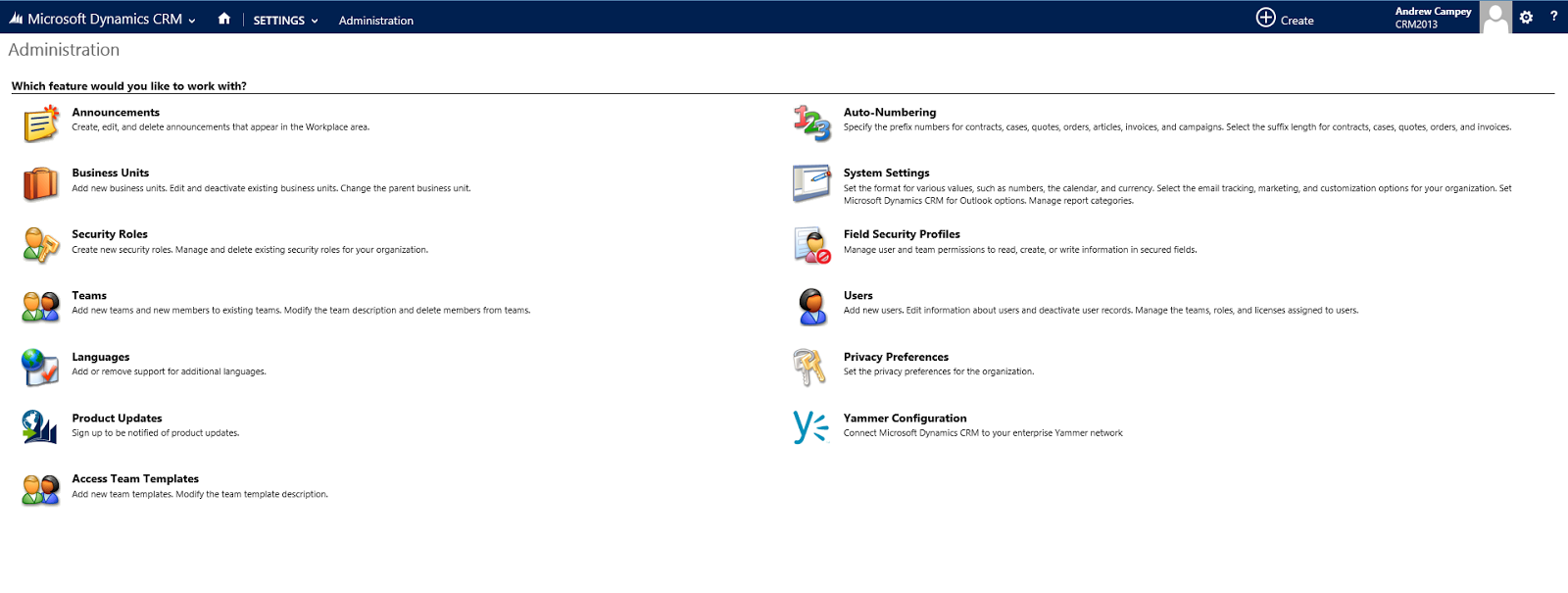 |
| CRM 2013 - Administration |
 |
| CRM 2015 - Administration |
 |
| CRM 2015 - Security |
The new setup is probably a more logical design as the
Security items now have their own area including the new Positions and Hierarchy
Security items. Hierarchy Security seems
like it needs its own post so I won’t go into any detail here.
The Administration area also has the Microsoft Social
Listening Configuration which allows you to use Microsoft’s Social Listening
solution to track Facebook, Twitter, YouTube etc. information which can then be
linked back into Accounts and Contacts so you can see how clients and the
public are relating to your company.
Business Rules
An interesting addition to CRM 2013 was Business Rules. The concept was fantastic as it in theory reduced
the JavaScript required, however in practise the reality was a two basic
limitations made them almost unusable.
Consider these scenarios:-
Scenario One
So you have a client whose preferred method of contact is
Email. Then logically they need to
provide an email address. However what
if there preferred method is Phone, Fax, or Mail? Programmatically you want the following:-
·
If Preferred Method of Contact is Email Then
o
Make Email Mandatory
·
Else If Preferred Method of Contact is Phone
Then
o
Make Phone Mandatory
·
Else If Preferred Method of Contact is Fax Then
o
Make Fax Mandatory
·
Else If Preferred Method of Contact is Main Then
o
Make Address 1: Street 1 Mandatory
In CRM 2013 you could not do If/Else so the above required
four separate Business Rules which becomes difficult when you have to start
doing this for multiple fields.
Scenario Two
If you want to ensure you capture either a Home or Mobile
phone for a client then you would like something like:-
·
If Home Phone or Mobile Phone do not contain Data
Then
o
Home Phone or Mobile Phone are mandatory
·
Else
o
Home Phone or Mobile Phone are not mandatory
In CRM 2013 all conditions were “and” so the above wouldn’t
work. We could reverse it and say where
Home Phone and Mobile Phone don’t contain data however what if we want
something more complex? CRM 2015 opens up this functionality by allowing and/or.
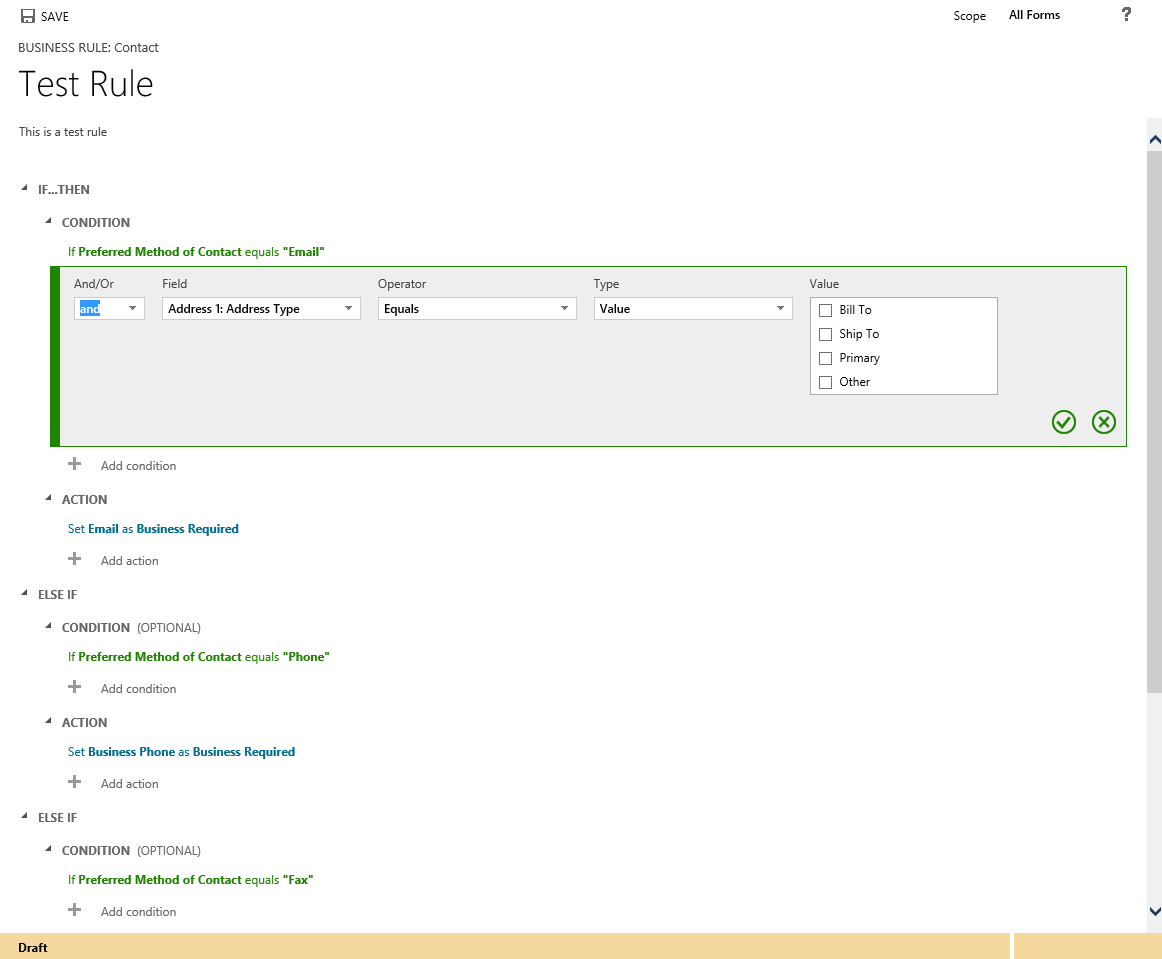 |
| CRM 2015 - Business Rule |
Combining the If/Else and And/Or allows for a lot more
customizability for the Business Rules which should greatly reduce the need for
a programmer to develop JavaScript solutions leaving them to worry about more
critical functionality.
Calculated and Rollup fields
CRM 2015 allows for fields to be of three types:-
·
Simple
The standard type from previous
versions of CRM for data entry.
·
Calculated
Allows for Conditions if required
(similar setup to Business Rules) and then allows actions using either a
current field or one of the following formulas:-
ADDDAYS
ADDHOURS
ADDMONTHS
ADDWEEKS
ADDYEARS
CONCAT
SUBTRACTDAYS
SUBTRACTHOURS
SUBTRACTMONTHS
SUBTRACTWEEKS
SUBTRACTYEARS
TRIMLEFT
TRIMRIGHT
This is useful if you want to create
a description for a record for example by combining multiple existing fields.
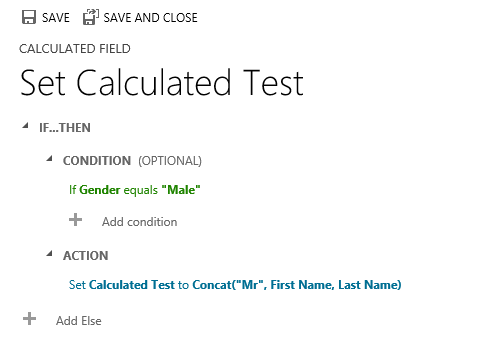 |
| CRM 2015 - Calculated Field |
·
Rollup
Rollup uses a related entity to do
one of the following functions:-
SUM
MAX
MIN
COUNT
This is good to see how many
contacts an Account has, or the total of child currency fields.
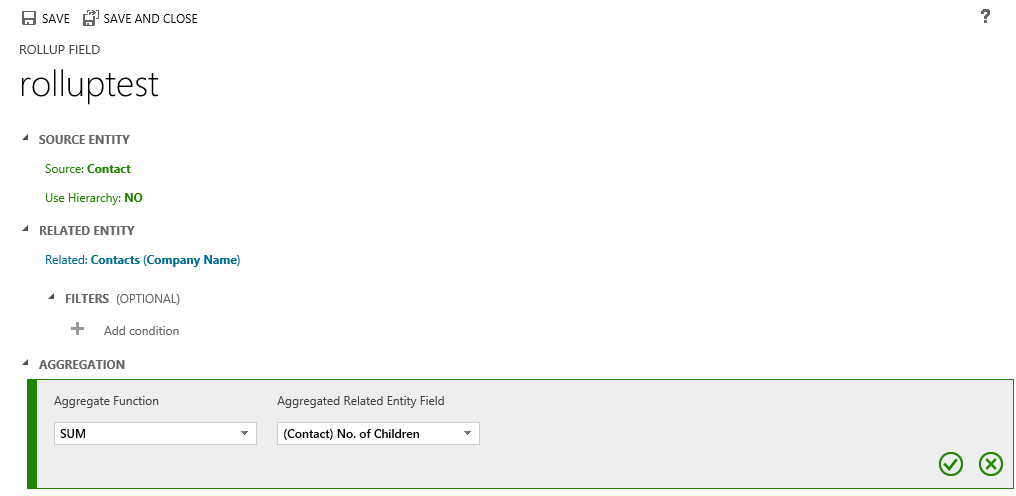 |
| CRM 2015 - Roll up Field |